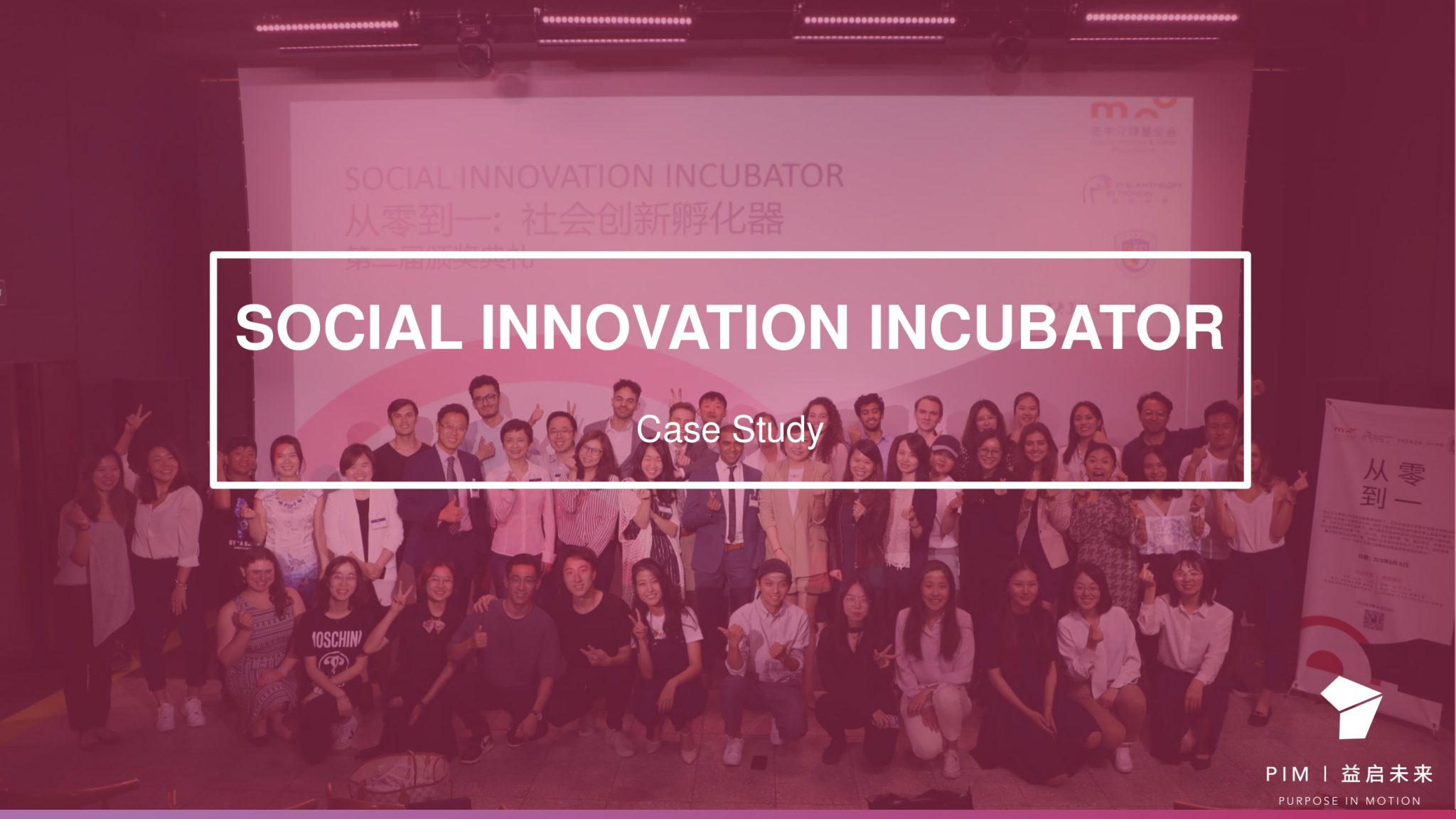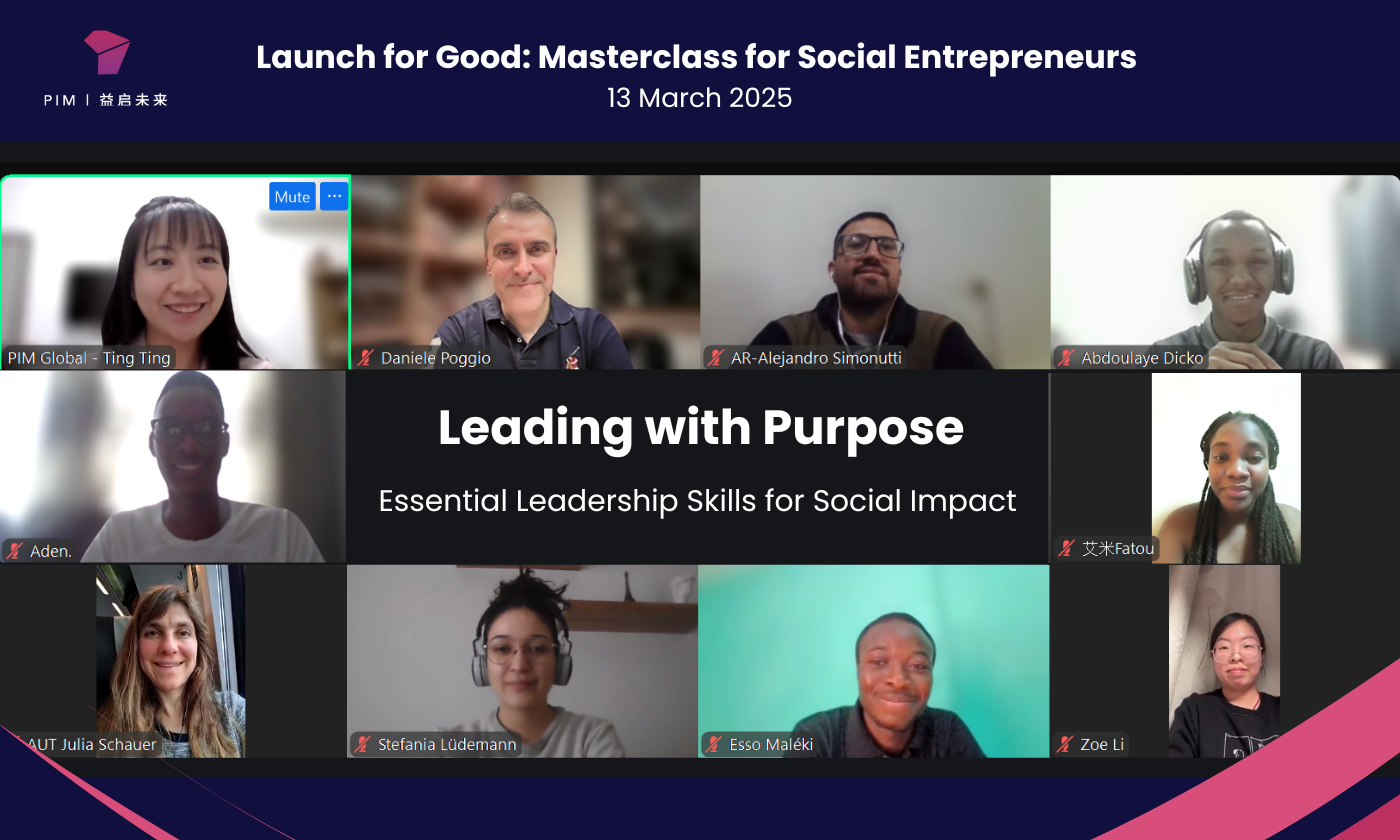Zero to One: Social Innovation Incubator
Supported by Laoniu Brother & Sister Fund at Central Academy of Fine Arts & Beijing Foreign Studies University
About the Laoniu Brother & Sister Fund
Laoniu Brother & Sister Foundation is a non-public-funded family foundation aimed at promoting growth and development of future generations and advancing social progress through effective charity. The foundation focuses on the development of future generations through supporting children welfare and youth entrepreneurship projects, and leading social progress with innovative philanthropic ideas.
Summary
From Zero to One: Social Innovation Incubator is a 13-week experiential program on social entrepreneurship aimed at fostering a culture of social innovation among university students in Greater China. Leveraging local entrepreneurs as instructors, online curriculum from Wharton School of Business, and seed funding opportunities supported by Laoniu Brother & Sister Foundation, the program empowers participating students to build business solutions that solve urgent social issues while cultivating core leadership and enterprise skills.
Situation and Background
PIM launched the Zero to One: Social Innovation Incubator program in 2018 with support from the Laoniu Brother & Sister Fund. Guided by a shared mission to increase social entrepreneurship and build a culture supportive of social innovation, PIM started with universities and their student communities.
The Laoniu Brother & Sister Fund and its founders believe firmly in the potential of young entrepreneurs to lead positive social change. While it is estimated that as many as 1/3 of millennials see social impact as an important priority in their lives and careers, few students have opportunities to gain exposure to social entrepreneurship in traditional coursework. Most universities in China lack resources in this emerging field, such as local case studies, practitioners or adjunct professors with experience in the field, or access to high-quality curricula on social entrepreneurship.
To help close these gaps, the Laoniu Brother & Sister Fund sought out a partner with expertise in youth entrepreneurship education, selecting PIM for its strong network of local and global universities, experience designing and delivering leading curricula in social impact, and close ties to diverse social enterprise organizations across China.
Together, PIM and Laoniu identified a diverse list of universities who could benefit from this type of program, soliciting input from PIM’s network of leading schools with specialties in fields ranging from policy and business to health and design. In 2018, Beijing Foreign Studies University’s School of Law joined as a partner, eager to provide both graduate and undergraduate students with practical experiences in entrepreneurship and social impact, followed by the Central Academy of Fine Arts in 2019.
Collaborating closely with the university and foundation partner, PIM came up with these program objectives, seeking to best address student needs:
- Expand perspectives and inspire action. Guide university students to learn how to identify social problems, understand real-world contexts locally and globally, and build an enterprise, broadening perspectives on social issues and their solutions.
- Building leadership skills and capacity for entrepreneurship. Provide a platform for young people to practice the entrepreneurial skills and know-how needed to contribute effectively to impact-driven ventures or business enterprises and develop as leaders.
- Engage the community and make real impact. Engage social entrepreneurs and organizations as mentors and case studies, while providing resources and seed funding to support students in driving projects having a meaningful impact on local communities.
Our Approach
Leveraging social entrepreneurship curriculum from leading universities around the world and drawing from our network of partner organizations, PIM developed Zero to One – Social Innovation Incubator program, launched at Beijing Foreign Studies University in 2018 and the Central Academy of Fine Arts in 2019. Bringing together undergraduate and graduate students from diverse majors, ranging from law to business to design, students formed teams to develop their social enterprise idea over the duration of a 13-week course, featuring:
Leading social entrepreneurs as mentors & local enterprises as case studies
Students are guided along their social entrepreneurship journey by entrepreneurs with rich social innovation experience, recognized by Forbes 30 Under 30, World Economic Forum, and top global universities. Instructors facilitate the experiential curriculum designed by PIM, including case studies discussions, skill workshops, and small-group mentorship.
World-class online curricula combined with skill-based training
From Zero to One uses a blended online and offline curricula on social entrepreneurship, rooted in project-based learning. Online lectures from Wharton and Acumen are combined together with offline workshops and project work, as students apply concepts learned online to develop their own projects. Students work closely with instructors as mentors, who provide them with personalized support.
To ground theory in real world examples, the course includes field trips to local social enterprises. Students connect with local entrepreneurs as inspiring role models, while engaging with their beneficiaries and observing local issues first-hand.
Seed Funding
Select teams are awarded funding and matched with mentors to implement their idea for up to one year post-program. With the support of PIM, team mentors, and Laoniu Brother & Sister Foundation, teams are equipped with resources and networks to build, measure, and learn as they develop their impact model. Teams also create and share toolkits and guides that allow for the project to be replicated in the future.
Results
Analysis of surveys and post-program interviews with students and instructors reinforced that the program provided students with the opportunity to engage in a high impact, active learning experience, while incubating projects with meaningful community impact. Academic partners reiterated that Zero to One program added value to their campus community, as a high-engagement program distinct from both traditional classroom experience and co-curricular opportunities available for students.
With over 60 participants in 2018 and 2019, student teams developed 12 unique community projects over the course of the semester. 7 were selected by a panel of judges for funding to continue the project with guidance from mentors for up to a year after completion of the semester course. Examples of winning student projects include:
Mobibox: 2,879 colleges and universities in China generate around 3 million plastic lunch boxes per week. Mobibox aims to scale a complete take-out recycling mechanism to replace the current use of disposable packaging boxes.
Left Right Project: 36 million migrant children in China follow their parents seeking work, drifting between cities. Left Right uses art education in migrant community centers to empower youth with tools to express their voices, share experiences and to foster creativity in migrant communities.
Kibera Project: Kibera promotes sustainable ecotourism and DIY handicraft experiences targeting Chinese tourists to generate greater income for slum inhabitants in Nairobi, Kenya.
Results from evaluation surveys and student interviews in 2018 and 2019 demonstrated that all participants in the 13-week course developed a better understanding of social innovation, and cultivated skills and knowledges related to entrepreneurship, business and social impact, adding social impact as a component of their future career paths. We found that students emerged from the program with:
-
Expanded perspectives and increased motivation to engage with social issues and their solutions. More than 75% of participants expressed a desire to launch or support a social enterprise or organization tackling a social issue in the future. More than 82% of survey respondents reported that they felt more confident and empowered to solve urgent social issues and to be a changemaker.
-
Strengthened core skills. 100% of survey respondents reported that the program equipped them with relevant business knowledge and helped them realize the importance of creating social changes in their future careers. More than 85% of survey respondents agreed the program helped them strengthen meaningful skill sets, including leadership, teamwork, decision-making, entrepreneurial mindsets and more.
- Expanded community connections. 100% of participants reported that the program helped them connect with new same-minded people and enlarged their social networks and social capital.
From developing this project… I have gained more resources and connections, and broadened my horizons and thinking about how to make change…, I have learned different kinds of problem solving, which I can’t learn in traditional classrooms.–Course Participant
What I’ve learned most from this project is that if you want to solve a problem, you must actively engage with your targeted group. You have to first understand what they need and what their pain points are. Those insights can neither be collected from the Internet nor be retrieved from imagination.–Course Participant
University leadership praised the impact the program and its participants had on the broader campus community, Encouraged by the project results, several professors indicated that they were eager to find additional ways to integrate social innovation curricula and hands-on impact projects into more of their core coursework.
What you are doing now is different from what your peers around you are pursuing, you are achieving things even you never imagined you could accomplish. I believe you all set a good example for your classmates and even for me. I see the impact and aim to support more students embark on the path of social innovation.–Fu Hongyu, Deputy Dean of Beijing Foreign Studies University
I saw students slowly and deeply dig, interview, and empathize, and do everything to solve these problems. This is something that touched me very much.–Charlene Ren, Course Instructor
About PIM
PIM empowers young people with the education, resources, and networks to become mission-driven leaders and effective changemakers. We partner closely with stakeholders (including universities, foundations, social organizations) to provide education and leadership programs and capacity building initiatives founded on a “learning by doing” model for investigating and solving social problems.
Interested in creating an experiential leadership development program for your community? PIM can help. With experience leading transformative education programs for over 2,900 young leaders since 2014, and a network of over 160 innovative social innovation partners in China, Rwanda, India, San Francisco, and more, PIM can help you tailor impactful professional development experiences for your community of young leaders that transfer back to positive community impact.




